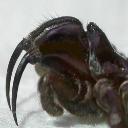Yahoo Answers is shutting down on May 4th, 2021 (Eastern Time) and beginning April 20th, 2021 (Eastern Time) the Yahoo Answers website will be in read-only mode. There will be no changes to other Yahoo properties or services, or your Yahoo account. You can find more information about the Yahoo Answers shutdown and how to download your data on this help page.
Trending News
Why is it that something has not evolved from arachnids that is not an arachnid?
There has been enough time for that to happen but nobody has seen it happen, or did I miss something?
8 Answers
- busterwasmycatLv 72 years ago
why is it that when you go down a road in one way, where you end up is not the city that lies in the other way? That is the essence of your question: the thing took a different path so why is it in a different place? We define the thing by its path, not its location, when we talk species. A bat is not a bird even though a bat has wings. Why not a bird? Because it was never a bird, never went down the road that birds took.
It did not take the high road to Dublin, so we do not call it a high-road traveler, even if it ended up in part of Dublin just the same.
Why is a native American different from a European American, or an African American, even if all three live in Tulsa Oklahoma today, and claim to be Tulsans?
- Bulldog reduxLv 72 years ago
You are indeed "missing something." But out of respect for your sensitive feelings, I'm not saying what I think that something is. Anyway, your question could be extended to wonder why something that is not an arachnid has not evolved from something else that is not an arachnid that has evolved from an arachnid, and . . . er . . . I seem to have lost track of my thoughts. Perhaps we have more in common that I first suspected.
- Elaine MLv 72 years ago
Surprise!
Spiders are related to horseshoe crabs, millipedes, octopus and scorpions.
--------------------------
Spiders and Octopi are distantly related . Spiders belong to the arthropods, the group of invertebrate animals with jointed legs and an exoskeleton, including Spiders and their relatives (scorpions, horshoe crabs, mites), insects, crustaceans (lobsters, prawns, crabs) and centipedes and millipedes.
Are spiders and octopuses related? - Quora
- Anonymous2 years ago
No new animal has evolved to be so different that they are no longer classifable as mammals or birds either. That is not unusual. Nevertheless, whales are so different from a typical mammal that one can make a case that perhaps they should be classified in their own class, instead of being classified in class Mammalia.
Animals and plants evolve if the environment changes. If the environment does not change, animals or plants may not change for tens of millions of years or perhaps even longer. For example, apes evolved about 25 million years ago, and yet there are still apes and they have not evolved into something else, except that one ape did evolve eventually to become us humans. It only took 5 million years for that to happen. IN fact the first species of humans first appeared 1.8 million years ago, so the whole process only took 3 million years. On the one hand there is no significant change after 25 million years but on the other hand there is rapid change in just 3 million years. The reason apes do not change is that they live in forests, and as long as there are forests, the apes do not need to change. The ape ancestor of humans, however, was forced to leave the forests when Africa was drying up and areas that still had forests were shrinking. Our ancestor had to evolve so they can survive in the African savanna, where there are few trees, little food for humans or apes, and where there are lots of dangerous predators. If our ancestors could not evolve, we would of course not be here,.
Evolution is simply unpredictable. In fact, some species may become extinct instead of evolving. If we look back at the arthropods found in the Burgess Shale, most of them went extinct without leaving any living descendants.
- How do you think about the answers? You can sign in to vote the answer.
- JazSincLv 72 years ago
I suspect you didn't miss anything.
The problem may be that the respiratory system and circulatory system restrict size, and novel mutations aren't going to be advantageous enough to compete with pre-existing arachnids without also, you know, being an arachnid.
That's a really interesting question, and if I could give you ten points for asking it, I would.
I can undermine my argument above by pointing out that cephalopods aren't a whole lot like other mollusks, so something really novel can come out of a clade that had restrictive anatomy.
My favorite evolutionary questions are:
Why aren't there any island flightless bats?
Why aren't there any live-bearing birds?
- daniel gLv 72 years ago
Sorry, it just doesn't work that way.
>pardon my brevity here but this involves a complicated genetic change over millions of years and not up to write a book so you understand. Arachnids specifically have hardly changed much at all in 350 million years. Adapting to survive on land they have not had the genetic need.
- Anonymous2 years ago
Jeez, who cares, who knows, maybe it's just not meant to happen.






